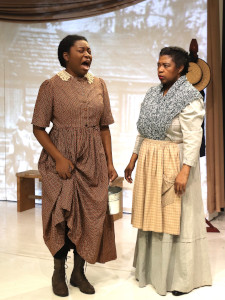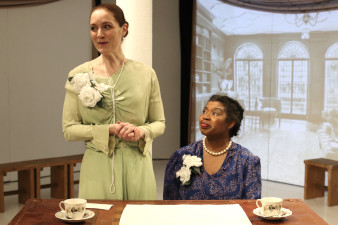
Glenda
Frank
BETHUNE “Bethune, Our Black Velvet Rose” by Richarda
Abrams, directed by Kathleen Brant
If we recognize the name Mary McLeod Bethune, it’s through her list of achievements-- educator, philanthropist, humanitarian, womanist, and civil rights leader. Playwright/actor Richarda Abrams has been fascinated by the black activist for more than two decades. Her one-woman show about Bethune, “First by Faith,” won the AUDELCO award for Best Solo Performance of the year. In “Bethune, Our Black Velvet Rose,” now at Theatre Lab, she has placed a heart in the center of the biodrama. Bethune’s journey from the daughter of an illiterate farmer to the halls of power as a national leader and advisor to presidents sounds more impossible than improbable, but step by step, we believe. Her passions, her power and her vision shine through this fine production. The uniqueness of the play lies in subtlety and restraint, creating worlds in short, fluid scenes. It opens with three statues and a young woman (Stephanie Anuwe). As she speaks to one of the statues, it comes to life and hands the girl the black rose she is carrying. The theme of legacy, this passing of the torch, repeats, often in simple dramatic gestures. Family support and affection empowered the activist. The young Bethune (Anuwe again) is 8 when we meet her, traveling to town with her father (Charles Black). It’s an easy-going relationship. He teases her, pretending to forget what candy she wants for her birthday. The scene turns dangerous when a drunken black man stands up to equally drunken Civil War veterans, and her dad pulls her to safety. Her mother (Abrams) recognizes the girl’s gifts. She solicit the father’s consent for Bethune to leave farm work to attend school and she stands up to a white farmer, with a mixture of courtesy and threat, after his sons attack the girl on her five mile walk to the school.
In one of the most evocative scenes, a stranger (Judy Jerome)
shows up, looking for black students for her school. It’s
a small miracle, easily seen as an answer to the girl’s prayers.
The woman looks white, but she tells the McLeods that her father
was white. And so we have in a blink a tiny treatise on privilege
and skin color, and perhaps even on rape. Throughout the first act,
the implicit irony of Bethune’s dream, preparing for missionary
work while conditions in America grow worse for black citizens,
is in counterpoint to her naïve, almost contagious passion
to save her African brethren. The formidable obstacles Bethune faces form the dramatic landmarks. Most shocking among them is the refusal of the religious college to permit their best student to serve as a missionary in Africa, Bethune’s dream – because missionaries are white. As the focus in the second act shifts to her achievements -- her work in the Black Cabinet, founding the National Council of Black Women, serving as president of several organizations – the biodrama becomes more conventional. Her discussions with Presidents Roosevelt and Truman and especially with Eleanor Roosevelt (Judy Jerome) are absorbing, but it’s the everyday glimpses into the dangerous, obstructive waters she had to navigate that are the most memorable. Director Kathleen Brant deserves more visibility. With only a modicum of furniture and props, she created imaginative worlds for us and helmed an impressive ensemble. The corners of the stage become locations. As Bethune reads a letter to Eleanor Roosevelt, the First Lady appears with a letter in her hand. Each cast member, many of them playing multiple roles, is a stand-out. As an actor Abrams brings us two distinct, strong women -- Bethune’s mother and the older Bethune -- as nuanced characters. They are remarkable performances. In contrast, Anuwe as the younger Bethune is more emotionally vulnerable, and her resemblance to Abrams adds a seamless credibility. Bryan Hickey as threatening Southern whites and as two presidents, and Judy Jerome in a multitude of characters are clear and engaging in each role. Samuel James Pygatt plays the charming Bethune men. Costumes by Sally Lesser and lighting by Duncan Davies. |
| recordings | coupons | publications | classified |


